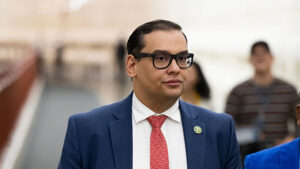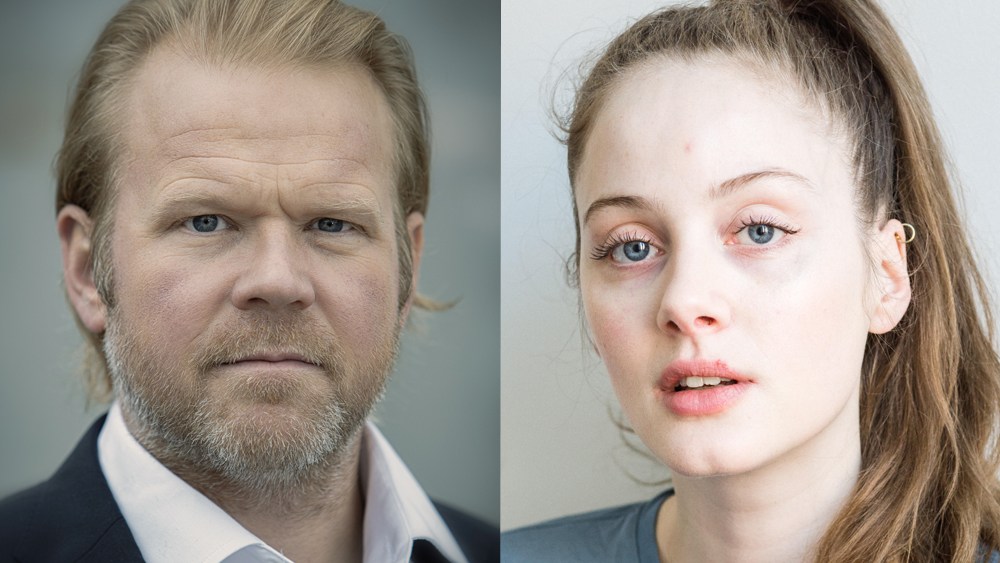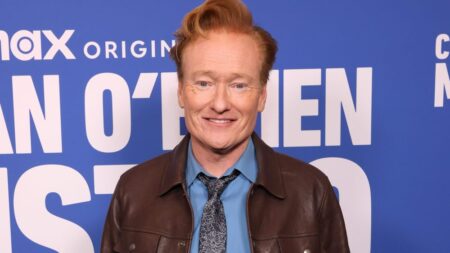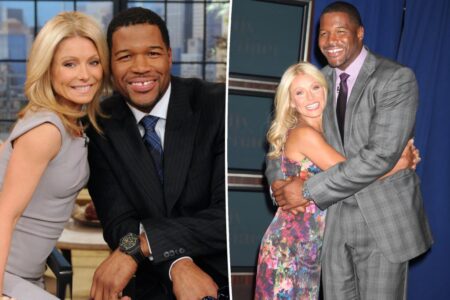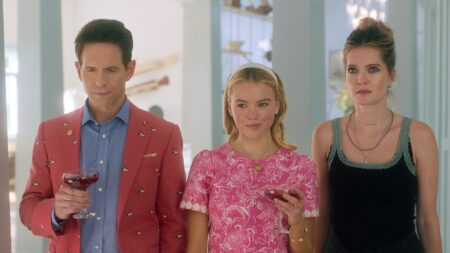“A Better Man,” backed by Norway’s NRK, a byword these days for adventurous shows, has a first teaser, which sets out he set-up for one of the major buzz titles set to world premiere this weekend in Canneseries competition.
Produced by Maipo (“The Crossing”), which won big at Canneseries’ first edition with “State of Happiness,” “A Better Man” excels – like some other of the series which will bow at Canneseries over April 24-29 – in its large relevance, drilling down on Internet trolling, the cancel culture and men’s notions of masculinity. It’s also brief, as many series shorten, just four episodes. But its issues are wrapped in what becomes a social survival thriller. Most important, it’s also often touching.
Beta Film, which handles international distribution, has just dropped a teaser which presents the miniseries’ basic set-up.
“Do you know what the fat around the penis is called?” feminist stand-up Live Steensvaag asks an audience at her sold-out show at the beginning of the teaser.
“A man,” she answers. Live gets a laugh and really gets Tom’s goat. For Tom, middle-aged, paunchy, biblical beard, reduced to working in his mother’s clothing store, Live reps everything wrong with modern Norway.
“You’re the least funny PC bitch in Norway,” he tells her on social media after she confesses that she was once “nearly” raped. “I’ll do the country a favor and complete your ‘nearly’ rape. Look for me in the audience, I’m the one not laughing,” Tom.
Identified by hackers after Live screens his tweet on a TV chat show, his most intimate secrets revealed – such as what porn sites he visits on the web – scared to venture out onto the street, Tom grabs what’s nearest to him – a wig and women’s clothing from his mother’s store as an effective disguise. Feigning to be a woman, the world opens up to him and he begins to tread a path towards redemption.
That road is, as director Thomas Seeberg Torjussen (“ZombieLars,” “Kuppel 16”) told Variety, a “roller coaster” ride as Tom, dressed as a woman, suffers some of the violence he wished on Live as Live, when Tom disappears of the face of the earth, tries to find him, worried she has unwittingly driven him to suicide.
Along the way, the series delivers a telling explanation of why people become online trolls, and how they might stop.
“A Better Man” is produced in collaboration with Artbox, and backed by not only NRK but ZDFneo, .a channel targeting younger viewers.
Bowing at Canneseries on April 27, “A Better Man” is toplined by Anders Baasmo, star of “Kon Tiki” and Netflix smash hit series “La Palma,” andIngrid Giæver, recently seen in Dag Johan Haugerud’s 2025 Berlin Golden Bear winner “Dreams (Sex Love).”
In the build up to “A Better Man’s” world premiere, they drilled down on their roles’ challenges, the show’s critique of trolling and why Norwegian pubcaster NRK keeps on delivering hits, while creator-director Torjussen added his take on he origins of trolling and he and producer Christian Fredrik Martin (“Kifrik”) talked about the notable achievements of Norway’s NRK:
A Better Man
Courtesy of Beta Film
Anders, I think your role must have been hugely challenging in that Tom goes through not just one but two transformations dressed as a woman and a large transformation as a person. But would you agree? And what were the particular challenges in terms of physical transformation?
Anders Baasmo: I totally agree, it’s one of the absolutely most challenging roles I’ve ever had. On the other hand, when the writing is this good, it isn’t that hard after all. It’s still much more difficult to breathe some life into bad scripts. The physical transformation came a little bit step by step, as it also did for the character, kind of. We called the two Berits for Berit 1.0 (2nd episode) and Berit 2.0 (3rd episode), and it came clear to me that playing Berit 2.0 was easier I will say – freer in finding the physical language and so – than Berit 1.0. I believe that has to do with the character getting more secure and whole in a way. The same with Tom; in episode 1 his core is insecure and blurry – compared to where he lands at the end of his journey – and that reflects in physical language, I believe. So, when I found and clarified his process, the physical transformation came by itself. And again; in that case it helps with a good script.
Live’s largest achievement in the series I suspect, will be to try to reach out and understand Tom in a society in other words to try to understand the “other,” in a society which suffers from radical polarisation.
Ingrid Unner Giæver: Yes, I think that Live moves from a general and vengeful (and I must say, understandable) ‘how could you’ to a sincere and empathic ‘why’ and ‘how are you’?
The largest challenge, however, I suspect was to encourage audiences to sympathise and invest in your character, Anders. That of course comes with good writing, but were there aspects to your performance which also tried to encourage this investment.
Baasmo: I believe one of the most important parts of acting, and step one in the working process with a role, is to build a good defense for the character. An understanding for why he’s doing what he’s doing. Not necessarily supporting his actions if they’re bad but finding a human path which makes it clear why it came to this and then defend him from there. As a defense attorney for the character, in a way. And once again, the script is King and Queen, as I usually say; everything starts there. I need to look for some ‘hooks’ that make sense to me, things that can link me – and my understanding of the world – to the character. It could be a sentence from the mother, it could be some reactions, and what he thinks and says of course. Finding a path and building some ‘flesh and bone’ on that, making a human being. I’ve had a frightening tendency through my career to get the audience’s sympathy, regardless of the bad things my characters have done. I don’t know why. Maybe it’s my method described above, maybe I’m just good-hearted through and through, or maybe it is my sorry baby face;-)
And what were the biggest challenges for you, Ingrid, playing Live?
Giæver: Honestly the biggest challenge was managing my own expectations to myself. Its such a unique and wonderful script, Thomas is such an amazing person and director and everyone else involved are just extremely talented. It’s easy to act a part that’s written so beautifully, I was just afraid I couldn’t deliver.
I think the series’ largest achievement is give an explanation for Internet trolling, deriving in Tom’s case from a sense of being unloved and unneeded. When he gains a sense of community and being of value to others, he becomes a better man. Or maybe I’m wrong….
Giæver: I agree, also I think the series is exploring what it means to be a person in a society that is increasingly less social. Tom is particularly isolated, but everyone generally has less eye contact with people and more with our phones. All three characters in the main cast are trying and struggling to find a way to communicate with someone, to have an honest conversation.
Torjussen: I hope you’re right! I think being of use, to be needed and wanted by anyone is what everybody needs. But it is easier said than done. As an urban single white male there is no obvious use for Tom, and it is killing him every day. The sense of community he feels with likeminded anonymous edgelords online is a sad substitute, but the only thing he must start with. We wanted to present an entertaining path from hatred and isolation to intimacy and reconciliation.
Baasmo: I think you’re spot on. I agree with what Thomas is saying. Getting out of solitude and isolation can be easier said than done. Especially in today’s digital daily life. And I hope Tom can be some kind of inspiration, that it’s possible to find a way out of it. I believe that we all find out – one way or another, in one phase of life or another – that it’s nothing more meaningful than being of value to others. (As both Ibsen and Shakespeare also have talked about;-)
“A Better Man” is commissioned by NRK. Year after year, NRK is commissioning notable series and has become one of the most notable public broadcasters in Europe. Is there any explanation for that or Norway’s rise as a production force, now matching Sweden and Denmark in terms of quality?
Torjussen: NRK has been good at trusting its creators. That trust and artistic freedom carries significant weight and feels to me as valuable as the money they invest. It allows for a distinct voice.
Christian Fredrik Martin: Drama productions are a key focus area for NRK and highly valuable to them and their trademark. NRK has been good at balancing bold editorial choices with high-end drama production for a broad audience’s segment. It’s almost as if their audience expects this from them in the myriads of dramas available. I think one important reason why Norway has been at the top of both Scandinavian and international film and TV-drama for a longer time, is thanks to a collective and systematic investment in talents that has been given the opportunity to develop over time and in continuity.

A Better Man
Courtesy of Beta Film
Read the full article here

